Teaching & Training Materials
Improving Practice
These materials are designed for teachers and professional development staff. Part of NCSALL’s effort to link research and practice, they have been developed using findings emerging from NCSALL research. All materials have been piloted with adult students or teachers and revised on the basis of their feedback.
Teaching materials are guides for classroom activities that teachers can use to develop adult students’ literacy skills and knowledge of particular content. Training materials are guides for professional development activities, such as study circles, that help teachers develop their own knowledge and skills in a specific area.
All Teaching and Training materials are PDF documents. You must have Acrobat Reader 4.0 (or newer) in order to download and view them.
Teaching Materials
- Understanding What Reading Is All About (July 2005)
Based on findings from reading research conducted by NCSALL and others, this guide offers 13 lessons designed to help learners understand the components of reading that are part of becoming a more fluent reader. The lessons can be used as an independent mini-course or be integrated into an existing curriculum. - Creating Authentic Materials and Activities for the Adult Literacy Classroom (April 2003)
Based on the findings of NCSALL's Literacy Practices of Adult Learners study, this book is an introduction to providing literacy instruction based upon the literacy needs and interests learners have outside of the classroom.
- Beyond the GED: Making Conscious Choices about the GED and your Future (April 2000, rev. 2006)
Newly revised to include new data and information on the Internet, this guide for GED instructors offers lesson plans and helps teachers develop as professionals. It also gives adult learners an opportunity to practice writing, use graphs, read charts, and analyze research findings on the economic impact of the GED.
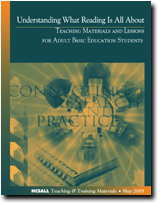
Training Materials
Study Circle Guides:
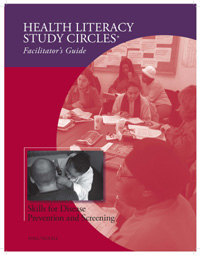 Skills for Disease Prevention and Screening (2007)
The goal of this 15-hour study circle+ is to prepare participants to help their students develop basic skills needed for engaging in disease prevention and screening activities. These skills include decision-making, using graphs and charts, calculating percentages, and interpreting risks and probability.
Skills for Disease Prevention and Screening (2007)
The goal of this 15-hour study circle+ is to prepare participants to help their students develop basic skills needed for engaging in disease prevention and screening activities. These skills include decision-making, using graphs and charts, calculating percentages, and interpreting risks and probability.
Health Literacy Study Circles+ Introduction
Overview Planning to Facilitate a Health Literacy Study Circle+ Facilitation TipsFacilitator's Guide: Skills for Disease Prevention and Screening
Overview and Preparation for Session One Materials in Preparation for Session One
Session One: Introduction to Health Literacy and Disease Prevention and Screening Session One Materials
Session Two: Identifying Disease Prevention and Screening Tasks and Underlying Skills Session Two Materials
Sample Lesson Packet—Lessons 1ó6
Sample Lesson Packet—Lessons 7ó12
Session Three: Integrating Health Literacy Skills into Instruction Session Three Materials
Session Four: Planning Lessons, Units, and Evaluations Session Four Materials
Session Five: Developing Strategies and Success Session Five Materials
- Adult Student Persistence (May 2006)
This study circle guide addresses issues of student persistence, motivation, and retention in adult basic education (ABE). This revised guide includes the second phase of the research on adult student persistence. Introduction
To Do Before Session One
Session One
Session Two
Session Three
Facilitation Tips
-
Skills for Chronic Disease Management
(2005)
The goal of this 15-hour study circle+ is to prepare participants to help their students develop basic skills needed for chronic disease management. These skills include reading medicine labels, following directions, and measuring dosages correctly; using measurement tools to monitor health; monitoring symptoms and talking to health care professionals the observations; and making critical decisions about health care.Health Literacy Study Circles+ Introduction
Overview
Planning to Facilitate a Health Literacy Study Circle+
Facilitation Tips
Facilitator's Guide: Skills for Chronic Disease Management
Overview and Preparation for Session One
Materials in Preparation for Session OneSession One: Introduction to Health Literacy and Skills for Chronic Disease Management
Session One MaterialsSession Two: Identifying Chronic Disease Management Tasks and Underlying Skills
Session Two Handouts
Session Two Readings
Sample Lesson Packet—Nine Sample LessonsSession Three: Integrating Health Literacy Skills into Instruction Session Three Materials
Session Four: Planning Lessons, Units, and Evaluations
Session Four MaterialsSession Five: Developing Strategies and Success
Session Five Materials
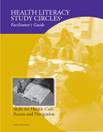 Skills for Health Care Access and Navigation
(August 2005)
Skills for Health Care Access and Navigation
(August 2005)
The goal of this 15-hour study circle+ is to prepare participants to help their students develop basic skills needed for accessing health-related services and for navigating health care systems. These skills include filling out forms, reading signs, and interpreting rights and responsibilities.Health Literacy Study Circles+ Introduction
Overview
Planning to Facilitate a Health Literacy Study Circle+ Facilitation Tips
Facilitator’s Guide: Skills for Health Care Access and NavigationOverview and Preparation for Session One
Materials in Preparation for Session One
Session One: Introduction to Health Literacy
Session One MaterialsSession Two: Identifying Access and Navigation Tasks and Underlying Skills
Session Two Materials
Sample Lesson Packet—Eight Sample LessonsSession Three: Integrating Health Literacy Skills into Instruction
Session Three MaterialsSession Four: Planning Lessons, Units, and Evaluations
Session Four MaterialsSession Five: Developing Strategies and Success
Session Five Materials
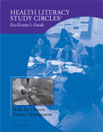
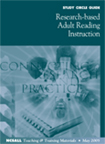
- Research-based Adult Reading Instruction (September 2005) - [10mb] This professional development guide provides all the steps, materials, and readings for conducting a 10Ĺ-hour study circle for adult basic education and literacy practitioners. The study circle covers the latest research on reading instruction.
- Adult Development (August 2005)
- Rethinking Instruction and Participation for Adult Basic Education (July 2005)
- Adult Multiple Intelligences (January 2004)
The goal of this study circle is to improve practice as practitioners learn about and evaluate Multiple Intelligences (MI) research and use this in their work.
Appendix A: Study Circle Flyer
Appendix B: Pre-Meeting Packet of Readings and Handouts
Appendix C: Session One Materials
Appendix D: Session Two Materials
Appendix E: Readings #6 and #14
Appendix F: Resources for the Facilitator
Appendix G: Feedback Form for NCSALL
- Learner Persistence in Adult Basic Education (December 2003)
This guide addresses issues of learner persistence, motivation, and retention in adult basic education (ABE). Based on findings from the NCSALL Adult Student Persistence Study, participants engage in an examination of their own interests and experiences with learner motivation and retention and examine strategies of other practitioners.
Appendix A: Study Circle Flyer
Appendix B: Pre-Meeting Packet of Readings and Handouts
Appendix C: Session One Materials
Appendix D: Session Two Materials
Appendix E: Session Three Materials
Appendix F: Resources for the Facilitator
Appendix G: Feedback Form for NCSALL
- Teaching and Learning in Authentic Contexts (November 2003)
This guide is based on research that examined the impact of the degree of authenticity of activities and texts and the degree of student/teacher collaboration on changes in literacy practices of students outside the classroom. Participants examine teaching and learning in authentic contexts, and discuss the challenges of using authentic instruction and integrating authentic activities and materials into their classes.
Appendix A: Study Circle Flyer
Appendix B: Pre-Meeting Packet of Readings and Handouts
Appendix C: Session One Materials
Appendix D: Session Two Materials
Appendix E: Resources for the Facilitator
Appendix F: Feedback Form for NCSALL
- Performance Accountability in Adult Basic Education (January 2000)
This guide provides step-by-step instructions to facilitate a multi-session study circle for practitioners on the topic of accountability. Practitioners will read and analyze research and discuss how to apply it in their classrooms and programs.
Appendix A: Study Circle Flyer
Appendix B: Pre-meeting Packet
Appendix C: Day One Materials
Appendix D: Study Circle Resource Center Materials
Appendix E: Feedback Form
Introduction
To Do Before Session One
Session One
Session Two
Session Three
Facilitation Tips
This study circle addresses Robert Keganís work in adult development theory and its application in the practice of adult basic education.
Appendix A: Study Circle Flyer
Appendix B: Pre-Meeting Packet of Readings and Handouts
Appendix C: Session One Materials
Appendix D: Session Two Materials
Appendix E: Resources for the Facilitator
Appendix F: Feedback for NCSALL
This guide addresses issues around organizing learning services for students in ways that make sense for them, and what the research says about it. The focus is on the structure and organization of instruction and how we can broaden the range of options that students have so that classes arenít the only option.
Appendix A: Study Circle Flyer
Appendix B: Pre-Meeting Packet of Readings and Handouts
Appendix C: Session One Materials
Appendix D: Session Two Materials
Appendix E: Resources for the Facilitator
Appendix F: Feedback for NCSALL
Other Guides:
- Evidence-based Practice: A Workshop for Training Adult Basic Education, TANF and One Stop Practitioners and Program Administrators (2007) The National Center for the Study of Adult Learning and Literacy (NCSALL) and the National Adult Education Professional Development Consortium (NAEPDC), with funding from the National Institute for Literacy (Institute), created a one-day workshop to assist practitioners and administrators in adult basic education, TANF (Transitional Assistance for Needy Families) and One Stop programs to understand evidence-based practice and develop strategies for continuously accessing, understanding, judging and using research. Downlad the accompanying workshop slides separately. Download a summary of the data about what participants learned in the Evidence-based Practice Workshop pilots.
- Health Literacy Study Circle+ Facilitators Training (2007)
The purpose of this guide is to help experienced professional developers and others organize and conduct a one-day session to train and orient those who will serve as facilitators of a HALL/NCSALL Health Literacy Study Circle+. This guide includes the information and materials you will need to conduct the training. 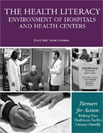 The Health Literacy Environment of Hospitals and Health Centers
Partners for Action: Making Your Healthcare Facility Literacy-Friendly (2006)
The Health Literacy Environment of Hospitals and Health Centers
Partners for Action: Making Your Healthcare Facility Literacy-Friendly (2006)
The guide and the review tools found within it offer an approach for analyzing literacy-related barriers to healthcare access and navigation. The findings of such a review could spark discussions and help shape strategies to eliminate literacy barriers and enhance health literacy.
- Research-based Adult Reading Instruction (July 2006)
This practitioner research training guide provides guidance for facilitators as they help practitioners investigate a problem related to reading. Practitioners conduct the research in their own classrooms.
About Practitioner Research Training
To Do Before Session One
Session One
Readings for Session Two
Session Two
Readings for Session Three
Session Three
Session Four
- Study Circle Facilitators (July 2006)
This training guide provides comprehensive instructions for preparing experienced adult education practitioners to facilitate NCSALL study circles. The training focuses on the NCSALL study circle, Research-based Adult Reading Instruction. However, the training can be adapted to prepare facilitators for NCSALL study circles in general or on another topic. The guide provides all the necessary materials and clear instructions to plan and facilitate a one-day, study circle facilitators training. The training is six hours in length.
About NCSALL Study Circle Facilitators Training
About the Study Circle Facilitators Training Guide
To Do Before the Training
Steps for Facilitating the Training
- NCSALL Seminar Guide: Implications of NCSALL Research for Program Administrators (April 2006)
This seminar guide was created to assist program administrators in accessing, understanding, judging, and using research for themselves and for their staff. Participants explore the Program Administrators’ Sourcebook: A Resource on NCSALL’s Research for Adult Education Program Administrators and other training materials available from NCSALL. - Program Administrators’ Sourcebook: A Resource on NCSALL’s Research for Adult Education Program Administrators (December 2005)
Introduction
Section 1: Teaching and Learning
Section 2: Adult Student Persistence
Section 3: Professional Development
Section 4: Outcomes of Participation in Adult Education
Section 5: Advocacy for Program Improvement
- Health Literacy Public Health Forums: Partners for Action (2004)
A "how-to" guide on designing and implementing health literacy forums of departments of health.
- NCSALL Seminar Guide: Establishing an Evidence-based Adult Education System (January 2004)
- Mentor Teacher Group Guide: Adult Multiple Intelligences (January 2004)
This guide provides detailed instructions for organizing a mentor teacher group to consider the implications of Multiple Intelligences Theory in instructional practice.
Appendix A: Meeting One Handouts
Appendix B: Handouts and Articles in Classroom Observation, Peer Coaching, and Mentoring
Appendix C: Meeting Two Handouts
Appendix D: Meeting Three Handouts
The purpose of the seminar is to help practitioners, program directors, state staff, and other policymakers read and discuss NCSALLís proposal for creating an evidence-based system for the field and then to understand and judge the relevance of such a system to their work in adult basic education.
- How Are We Doing? An Inquiry Guide for Adult Education Programs (2001)
This guide helps local adult education programs facilitate a systematic exploration of program performance.


 Printer-friendly page
Printer-friendly page